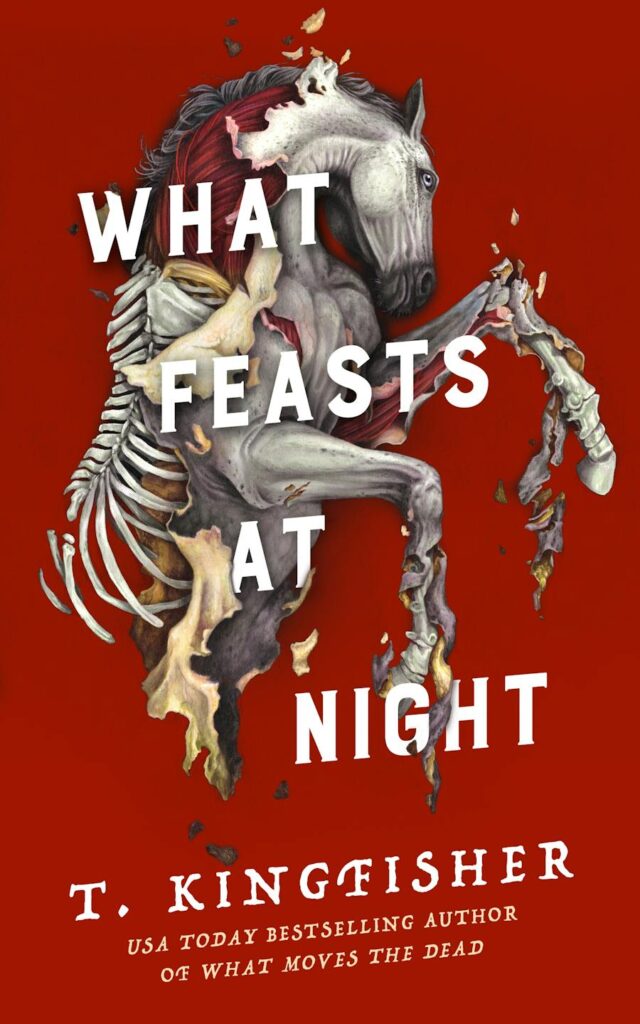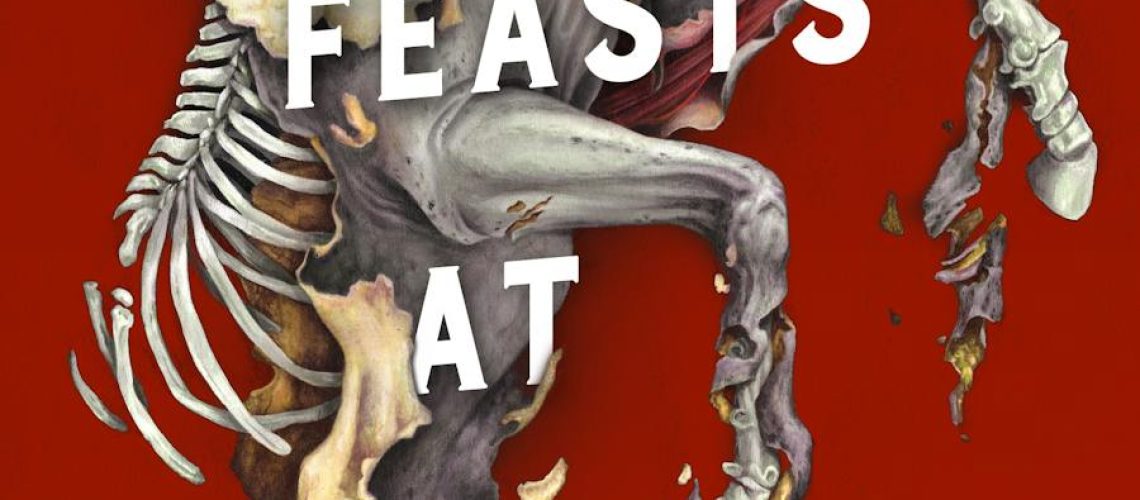Since T. Kingfisher’s What Moves the Dead was one of my favorite novellas of 2022, it’s no surprise that I wolfed down its sequel, What Feasts at Night. There are some significant differences in Sworn Soldier #2, which is available for preorder now and will be released on Feb. 13, but most of what made the first book in the Sworn Soldier series enjoyable returns or is expanded upon here.

I think a reader could conceivably start the series with this second novella, although that would mean missing some of its impact and a fair number of references. However, although this is labeled a horror series, I found this sequel significantly less horrific than What Moves the Dead; it’s more of a dark fantasy. So if fungal fiction gives you the shudders, you may want to forego the first book and start with What Feasts at Night instead (a few mushrooms are mentioned here, but they’re not menaces).
As before, the viewpoint protagonist is former soldier Alex Easton, accompanied by their former batman Angus, soon joined by mycologist Miss Eugenia Potter. This time, instead of the decaying Usher mansion, the setting is Easton’s humbler family hunting lodge. Angus has guilted Alex into inviting Potter there to sketch the local flora and fungi, as a token of thanks for her efforts in avoiding destruction with the Ushers.
When they get to the lodge in the backcountry of Gallacia, they find it in a state of disrepair, as the caretaker died some time ago. Alex hires the cranky Widow Botezatu and her husky son, Bors, to start bringing it into order, but it turns out that there’s something much worse going on than a partly collapsed springhouse. Rumor in the village has it that the old caretaker’s fatal illness was caused by a creature out of old legends, and soon Bors falls sick himself, and things keep getting more and more dire.
Unlike What Moves the Dead, which riffed on The Fall of the House of Usher by Edgar Allan Poe, What Feasts at Night does not appear to be based on any particular work of literature, although the monster-myth that’s referenced does appear in Romanian folklore (Gallacia is a made-up European country). That’s fine; using Usher as a springboard may have helped launch the series, and I had wondered if other stories in the series would continue riffing on other old horror works, but with the character complexities and historical backstory now well established, there’s more than enough to build new stories on without borrowing from others. Not that I would mind that; I loved What Moves the Dead and how it addressed and revised some of the more problematic elements of the original Usher tale, plus all the original elements that Kingfisher added.
I did not find the climax of What Feasts at Night entirely satisfactory. For one thing, the stakes are lower than in the first novella, as the problem is more of a localized phenomenon and unlikely to grow. Moreover, the first book had characters really working together, but here, although others provide aid and advice, it basically feels like Alex’s show with supporting characters, instead of a group effort. Finally, the resolution to the crisis comes about more via Alex’s floundering persistence than any clever stratagem. However, in Alex’s own words, “I’ve never claimed to be the sharpest tooth in the wolf’s mouth,” and there is certainly value in persistence, however uninspired.
I also don’t think the title quite fits the content of What Feasts at Night. Feasting, to me, implies a certain level of revelry, but although there’s a dinner party of sorts, very little celebration appears to be felt by anyone in this novella.
However, there is great satisfaction in reading it. As always, Kingfisher does a wonderful job immersing the reader in whatever environment she’s describing; I was reveling in the description of the countryside from the first page.
Characterization is also a key to enjoying this novella. I love Alex’s sardonic commentary on life in Gallacia, from its looming landscapes and forbidding forests to the people who inhabit it and are shaped by it. Gruff Angus and the sharp-tongued Widow Botezatu also offer definite points of view, along with interesting perspectives from a priest and a doctor. (Bors is just a nice, hard-working peasant, but his mother turns out to be quite ruthless in defense of her son.) Potter, disappointingly, mainly plays a comic-relief role in this sequel, as she struggles with a poorly translated Gallacian phrasebook. Maybe she’ll get to have a greater effect on events again if a third novella happens.
I’ve never been a soldier, so I can’t speak with any authority on Alex’s war experiences, which seem to have more of an impact in this novella than the first, both physically (tinnitus) and mentally (flashbacks). But I’ve read a fair number of military memoirs and war fiction, and I was really struck by one passage where Alex talks about how after one has been in a war, it’s never really over, more of a place to keep stumbling across than a past that can be truly left behind. (It’s much better coming from Kingfisher than I’ve put it here.) Kingfisher and her alter ego, Ursula Vernon, have written quite a few books that concern soldiers and war, and she has quite a way with words, coming across as entirely empathetic and authentic.
Content warnings: Illness, war trauma, nightmares, predation.
Disclaimer: I received a free electronic Advanced Reader Copy of this novella for review purposes.







